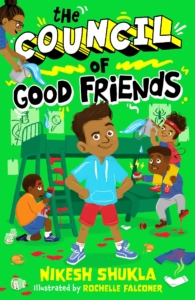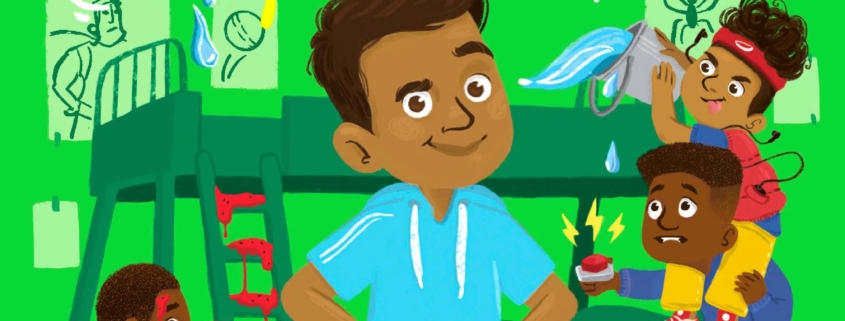The Council of Good Friends is a new book from author Nikesh Shukla and Knights Of. We are thrilled to share a Q&A with Nikesh below!

Can you tell us a bit about your new book?
The book is about a group of friends, a group of male friends, a group of male friends who are there for each other, a group of male friends who are there for each other, but also get into capers, mischief, chaos and scrapes, just because… well, we all do, right? I wanted to write a book about boys who aren’t afraid of being vulnerable with each other, boys who can communicate and say how they feel, boys who can hold their hands up when they get stuff wrong, and boys who get into capers. It’s about Vinay, Musa, Inua and Nish, a solid group of friends who play together and hang out and watch every Marvel film and play football and cricket, and also, get into capers. When Vinay is about to get his own bedroom, he is horrified to learn that he has to share it with his cousin from India, Nikesh, and Nikesh thinks it’s his room. This kicks off a prank war that sends the boys to the edge and back.
Did people you know influence the characters – personalities, habits etc?
The characters are named after great, great friends of mine. But the make up of the group is very much a classic sitcom set up. You have the (and excuse the traditional gender roles here, I just suggest this as a way of writing comedy rather than how I think society should be constructed)… you have the patriarch, the matriarch, the craftsman and the clown. The patriarch is the ambitious one who dreams of a better life, the matriarch creates a place to nest and nurture, the craftsman is scheming and shortcutting their way to what they want and the clown is the architect of their own destruction. It’s a classic sitcom set up and I wanted to push towards that. So once I had those core archetypes down, it was about peppering details about the people they’re vaguely inspired by on to the character. But the Vinay in the book is not my friend Vinay and the Nikesh is not me!! My kids read it and were both like, ‘you’re the baddie in this…’ which made me laugh. Somehow I couldn’t convince them I was inspired by comedia dell’arte.
What do you hope readers will take from the book?
That you can make mistakes and get things wrong, and that doesn’t make you a bad person. What counts is what you do next.
How do you hope schools might use the book?
To kickstart a conversation on emotions and mental health, to talk about friendship groups and male friendships and to just have a laugh.
Were you a reader as a child?
Yes. I used to go to the library every week. I devoured comics and Star Trek and Star Wars novels and sci-fi and crime, and I read so much. I read everything I could get my hands on. I think one of the things I know about myself is that I’m a better reader than I am a writer. And that’s a good thing.
Favourite books from your childhood? And now – which children’s authors / books do you particularly love?
Spider-Man. It was always about Spider-Man.
What do you enjoy most about being an author?
Apart from telling stories for a living, reading and writing for a living, using my imagination for a living, it’s that feeling when you go into a bookshop and there’s your book, a collection of ideas you had in a certain time period, printed and presented to the world.
What is the biggest challenge when writing?
Keeping out external opinions about your work. Reviews are not for you, they’re for readers. Sure, if there is a critical engagement with your work that can help you be a better writer, then do engage with it. But Amazon reviews, GoodReads, reviews in newspapers, prize lists, best books to read on the toilet or at the beach or on a crowded bus or when you’re a bit sad lists, authors to look out for lists, and all those things, they’re designed to bring readers to books. They’re not going to make you a better writer. So it’s best to avoid them. I’m not doing this to have a perfect GoodReads rating or be the best author to read on the toilet or win a prize. I’m here to tell stories and ask questions about myself and the world, and none of that other stuff is guaranteed. If anything, it’s bonus. And it’s best not to expect them. So I just get on with the work. I’m ambitious, but about the scale of the work. I know authors love all that stuff, and that’s totally fine, but it’s just not for me.
What are your top tips for budding young writers (children)?
Keep reading.
Keep writing.
Make sure it’s a story you really care about.
The Council of Good Friends by Nikesh Shukla, illustrated by Rochelle Falconer, is published by Knights Of, out now. www.knightsof.media
Views expressed do not necessarily reflect those of the Federation.




